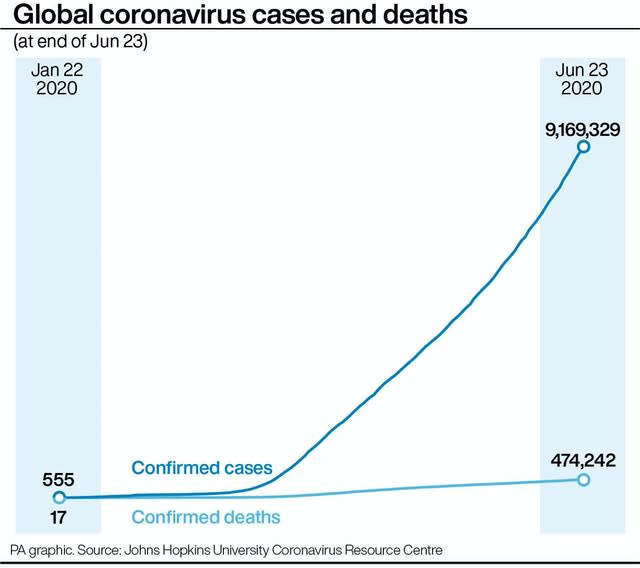Coronavirus resurgence sends cases to new highs in south and west of the US
A coronavirus resurgence is wiping out two months of progress in the US and sending infections to new levels across the country’s south and west.
The US recorded a one-day total of 34,700 new Covid-19 cases, the highest level since late April, when the number peaked at 36,400, according to the count kept by Johns Hopkins University.
While newly confirmed infections have been declining steadily in early hot spots such as New York and New Jersey, several other states set single-day records this week, including Arizona, California, Mississippi, Nevada, Texas and Oklahoma.
Some of them also broke hospital admission records, as did North Carolina and South Carolina.
Stocks slid on Wall Street as the news dampened hopes for a quick economic turnaround. The Dow Jones Industrial Average lost over 700 points for a drop of 2.7%. The broader S&P 500 fell 2.6%.
The virus has been blamed for over 120,000 US deaths – the highest toll in the world – and more than 2.3 million confirmed infections nationwide. On Wednesday, the widely cited University of Washington computer model of the outbreak projected nearly 180,000 deaths by October 1.
California reported over 7,100 new cases, an all-time high. Florida’s single-day count surged to 5,500, a 25% jump from the record set last week and triple the level from just two weeks ago.
In Texas, which began lifting its shutdowns early on, on May 1, hospital admissions have doubled and new cases have tripled in two weeks. Governor Greg Abbott said the state is facing a “massive outbreak” and might need new local restrictions to preserve hospital space.

The Houston area’s intensive care units are nearly full, with coronavirus patients filling about one in four beds, and two local public hospitals are running at capacity, mayor Sylvester Turner said.
In Arizona, emergency rooms are seeing about 1,200 suspected Covid-19 patients a day, compared with around 500 a month ago. If the trends continue, the state will probably exceed its hospital bed capacity within the next several weeks, said Dr Joseph Gerald, a University of Arizona public health policy professor.
“We are in deep trouble,” said Dr Gerald, urging the state to impose new restrictions on businesses, which governor Doug Ducey has refused to do.
Infectious-disease expert Dr Peter Hotez of the Baylor College of Medicine in Texas said he worries that states will squander what time it has to head off a much larger crisis.
“We’re still talking about subtlety, still arguing whether or not we should wear masks, and still not understanding that a vaccine is not going to rescue us,” he said.
North Carolina governor Roy Cooper, a Democrat, ordered people to wear masks in public as the daily count of hospital admissions and new cases hovered near records. In Florida, several counties and cities recently enacted mask requirements and cracked down on businesses that do not enforce social distancing rules.
Right now, the data is showing that we need to hit the pause button on reopening. But if we all work together and wear face coverings, we can protect our loved ones and get our trends back in the right direction to restore our economy and beat this virus. https://t.co/iW0MuUYGQ8 pic.twitter.com/zOvvELNJmr
— Governor Roy Cooper (@NC_Governor) June 24, 2020
In a sign of the shift in the outbreak, New York, Connecticut and New Jersey announced they will require visitors from states with high coronavirus infection rates to quarantine themselves for 14 days. That is a turnaround from March, when Florida issued such an order for visitors from the New York City area, where cases were soaring.
Cases are also surging in some other parts of the world. India reported a record-breaking one-day increase of nearly 16,000 cases. Mexico and Iraq hit new highs as well.
But China appears to have tamed a new outbreak in Beijing, once again demonstrating its ability to quickly mobilise its vast resources by testing nearly 2.5 million people in 11 days. China reported 12 cases nationwide on Wednesday, down from 22 the day before.
In Europe, countries are easing or increasing restrictions as the outbreaks evolve.
John Nkengasong, chief of the African Centres for Disease Control and Prevention, said the outbreak on the continent is “picking up speed very quickly” as more countries loosen lockdowns.
Worldwide, more than 9.2 million people have been confirmed infected, and close to half a million have died, according to the Johns Hopkins count.

